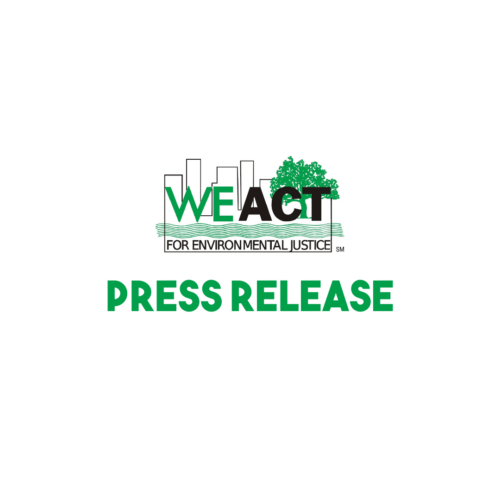Annual American Lung Association Report Grading Air Quality
Gives Manhattan and Staten Island a D and the Bronx and Queens an F
FOR IMMEDIATE RELEASE
April 21, 2023
Contact: Chris Dobens, chris@weact.org, 718-679-8542
HARLEM, NY – In response to Wednesday’s release of the American Lung Association’s 2023 State of the Air report, which included a New York Air Quality Report Card, WE ACT for Environmental Justice’s Director of Policy Sonal Jessel issued the following statement:
“It’s hard to celebrate Earth Day when four out of the five boroughs in New York City had such dismal ratings for ozone levels in the air. And it’s like that all five boroughs do fall into that category, except that Brooklyn did not provide data for the report.
Ozone is formed by chemical reactions of air pollution in the atmosphere by the emissions from the burning of fossil fuels in buildings and vehicles as well as from factories and other industrial sources. Ozone becomes more dangerous with more sunlight (which causes the chemical reactions), so with the rise of extreme heat, this problem will only get worse. Ozone air pollution is also one of the most dangerous pollutants, and even short-term exposure can cause respiratory illnesses and a wide variety of other health issues, including premature death.
This is bad news for New Yorkers, and especially for people of color, because they are exposed to disproportionate amounts of air pollution (that turns to ground-level ozone) and other environmental hazards. This results from the fact that most sources of pollution, like industrial facilities and bus depots, have been placed in communities of color, turning them into sacrifice zones.
That is why we worked with our fellow environmental justice advocates to pass New York State’s Cumulative Impacts law late last year. Communities of color throughout the state have historically been burdened by a disproportionate number of pollution-generating facilities such as factories, power plants, bus depots, sewage treatment plants, garbage dumps and transfer stations, and trucking centers. The cumulative impact of these multiple sources of pollution exponentially increase the adverse health impacts on the people living in these communities, including asthma, lung and heart disease, increased birth defects, and learning impairments.
Prior to the passage of this bill, New York’s laws and regulations did not take the cumulative impacts of pollution into account when approving the permits for such facilities, instead treating them as if they were the only source of pollution that residents would have to endure. The new Cumulative Impacts law changes that, and is widely recognized as landmark legislation in addressing the environmental racism that has plagued the health and well-being of these communities for generations.
We watched in horror as communities of color across the state, including many of those in the boroughs of New York City that received dismal ozone grades from the State of the Air report, suffered higher rates of illness and mortality during the COVID-19 pandemic. But for those of us who fight for environmental justice, this wasn’t a surprise, given that there are many studies linking the higher incidence of chronic diseases – which are often cited as the underlying conditions leading to worse COVID-19 outcomes – to the adverse health impacts of air pollution, which studies also link to the cumulative impacts of exposure in these communities.”
We still don’t know when the state will put this Cumulative Impacts law into effect. But once it does, hopefully we will be able to celebrate Earth Day again instead of lamenting the woeful air quality are communities are forced to live and die in.”
# # #
WE ACT for Environmental Justice is a Northern Manhattan membership-based organization whose mission is to build healthy communities by ensuring that people of color and/or low-income residents participate meaningfully in the creation of sound and fair environmental health and protection policies and practices. WE ACT has offices in New York and Washington, D.C. Visit us at weact.org and follow us on Facebook, Twitter, and Instagram.
